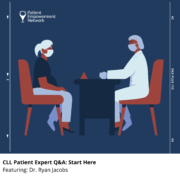Can CLL Patients Take a Break From BTK Inhibitors?
Can CLL Patients Take a Break From BTK Inhibitors? from Patient Empowerment Network on Vimeo.
Is it possible for chronic lymphocytic leukemia (CLL) patients on BTK inhibitors to take a treatment break? Expert Dr. Danielle Brander shares insight.
Dr. Danielle Brander is an Assistant Professor in the Division of Hematologic Malignancies & Cellular Therapy at Duke University Medical Center. Learn more about Dr. Danielle Brander.
Download Resource Guide | Descargar Guía en Español
Related Programs:

|

|

|
Transcript:
Lisa Hatfield:
So this patient is telling us that he’s trying to plan life while living with cancer. It’s a challenge. It’s hard to know where to start. Can some patients go off of ibrutinib (Imbruvica) after five years and enter a watch-and-wait kind of program? And will they be monitored during that time too, if they ever do go off of the medication?
Dr. Danielle Brander:
Yeah, more excellent, excellent questions. So of those main categories of treatment, the BTK inhibitors are given continuously, meaning, at least so far, the standard way we recommend of those treatments is that they’re taken every day, either once or twice a day, depending on which BTK inhibitor, and they’re taken every day. Unless patients run into progression, meaning the CLL learns to grow through its resistance or patients run into side effects that despite maybe team’s recommendation of changing the dose or holding the medications, that it’s just the medication is just not tolerated.
In those cases, there are cases where we do recommend stopping the treatment because of side effects. And the key there is that patients if depending how long they’ve been on treatment or how their CLL is responding, might not need to go on to the next treatment right away.
So to answer this patient’s question, if they were to run into a side effect that wasn’t manageable, there are patients where we say, stop treatment and let’s just watch things, see if you need treatment, if your CLL has no other reason to jump into the next therapy. And there have been encouraging things that we’re learning and that I think are hopeful to this patient’s question, which is maybe in the future there are patients where we proactively can tell them to stop after a certain time because of what we’ve learned for patients so far.
But at the current moment in time, we don’t tell patients to stop at a certain amount of time. But there are trials that are looking at that after a certain number of years. And there are also trials that have followed patients who have stopped therapy and some of those patients, as I mentioned, who are told to stop treatment due to other side effects or other reasons, may go a long time, a couple of years before they need to start therapy.
Share Your Feedback
Create your own user feedback survey










